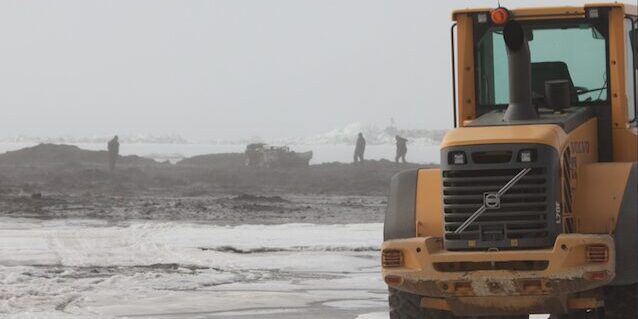The early break-up of sea ice has left winter gold-dredging operations scrambling to haul equipment back to shore. And not everyone has fared well so far.
“It was pretty crazy, saidJesse Strickling, part of the Lazy Gator mining operation that got cut off from shore when the chunk of ice they were staged on detached Sunday.
“We’d been running our little tails off at the end of the season trying to get the last bit of gold we could,” he explained. “We went out there, got everything packed out, packed up and got ready to leave and turned around to go home and there was an open lead there. We all kind of freaked out for a couple minutes.”
At stake were trucks, all-terrain vehicles, and mining equipment worth about $100,000 all together—not counting tens of thousands of dollars in gold.
That evening, Alaska State Troopers followed up on reports of a stranded mining party.
“We were dispatched at approximately 5:30 for some people that were stuck on an ice flow,” said Matt Johnson, chief of Nome’s Search and Rescue operations. “And we traveled up the west beach about 8 miles with a Zodiac Raft and brought two individuals back to the shoreline.”
Strickling and others told rescuers they had things under control, though two crewmembers were exhausted from hours of work and accepted a ride back in to town. Johnson says rescue operations connected to mining have risen the last few years.
“We’ve definitely had to respond more this year than we have in the past for gold miners. In the past it’s been for people that have been out hunting and can’t get back to shore, and now we’re having to respond out for people that are leaving the shore and going out to sea.”
Spenser McClesky is in his second season dredging on the ice. He says last year there were just five crews, but this year that had jumped to 11 or 12, partly from economic pressure for operations to stay profitable year round. And partly from Discovery Channel’s Bering Sea Gold franchise.
“It’s really crazy that the ice is leaving this early and that we’re even having this issue,” McClesky said of the rapid ice rot that left the vehicle of one of his co-workers half-sunk in the ice Sunday night. By Monday afternoon it had been hauled to shore and was being repaired at a shop in Nome. “Usually the ice doesn’t leave for a couple weeks, everybody expected us to have a couple more weeks. But now it looks like the season’s over.”
There is very little regulation of the burgeoning cottage industry on the ice. Officials at Nome’s port and city office say they are not responsible for offshore property or safety issues. Department of Public Safety spokesperson Megan Peters says Search and Rescue mobilizes to save lives, but not property.
Charlene Bringhurst works for the Department of Natural Resources handling mining permits and leases. She says that regulatory and reporting protocols with her agency, along with the Department of Natural Resources and Coast Guard are built around the summer season on open water. In the winter there is no state or federal agency with safety or environmental oversight present in Nome to monitor gold dredging on the ice. If operators do spill fuel or lose equipment in the water, they’re responsible for reporting it to DEC and DNR. But neither agency has boots on the ground until the summer.
The Lazy Gator crew made another attempt last [Monday] night to get back the last of their equipment. They cut out a large section of ice beneath the trucks and towed them toward the solid ice-shelf attached to shore. They were six feet away when the float ran ashore. But they got lucky.
“We had to just wait it out. The tide came in and pushed it up onto the beach. It started pressure-ridging pretty good and we drove the trucks off.” Strickling says they had about a 30 second window to get the trucks over a small chunk of ice that wedged between their float and the shore-ice, creating a temporary bridge. The float they’d towed to shore was, by that point, breaking apart beneath the vehicles.
“Really lucky though, we didn’t lose any equipment, there was no trash left behind, or it didn’t sink any trucks or anything like that.”







